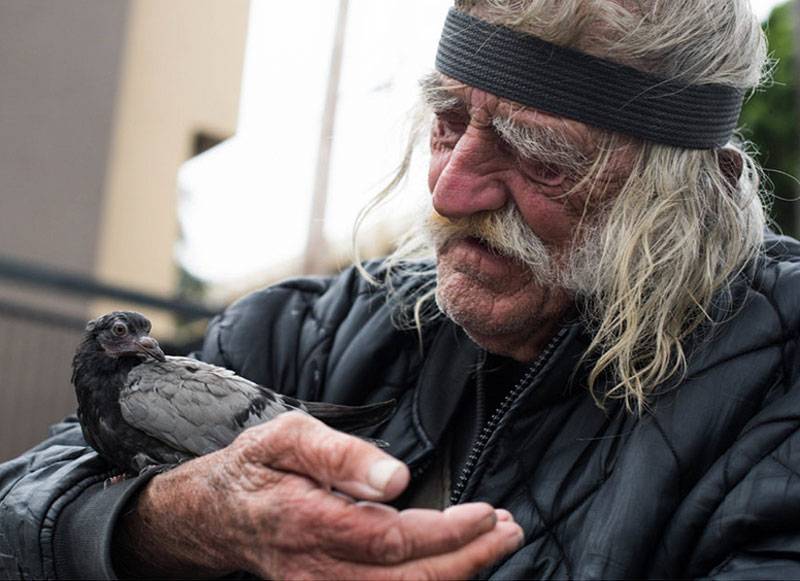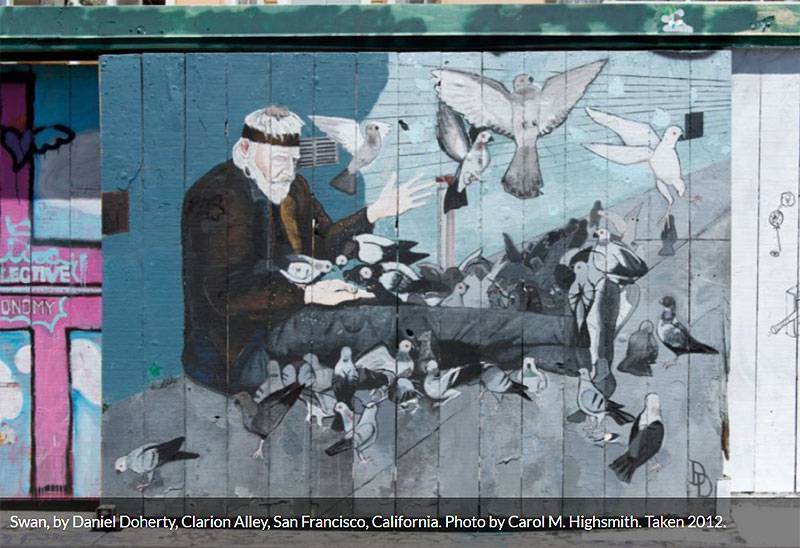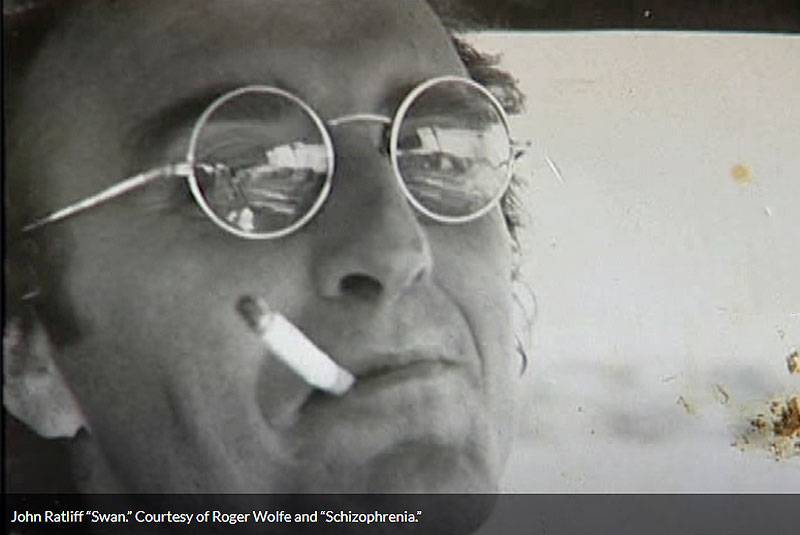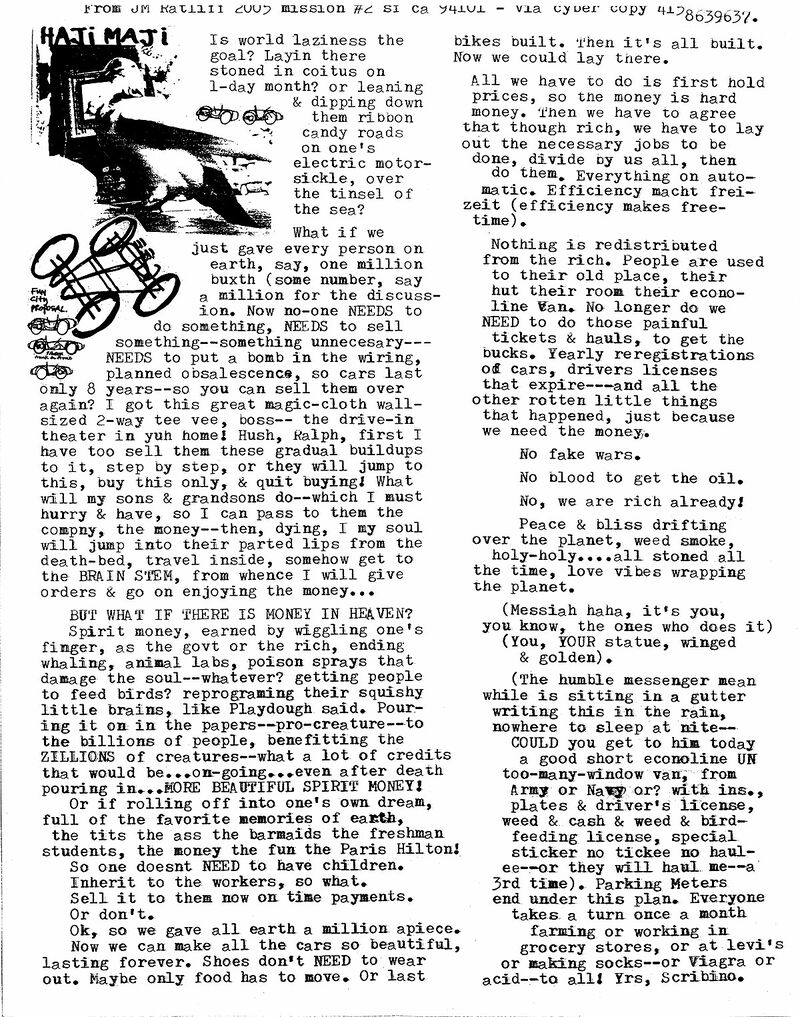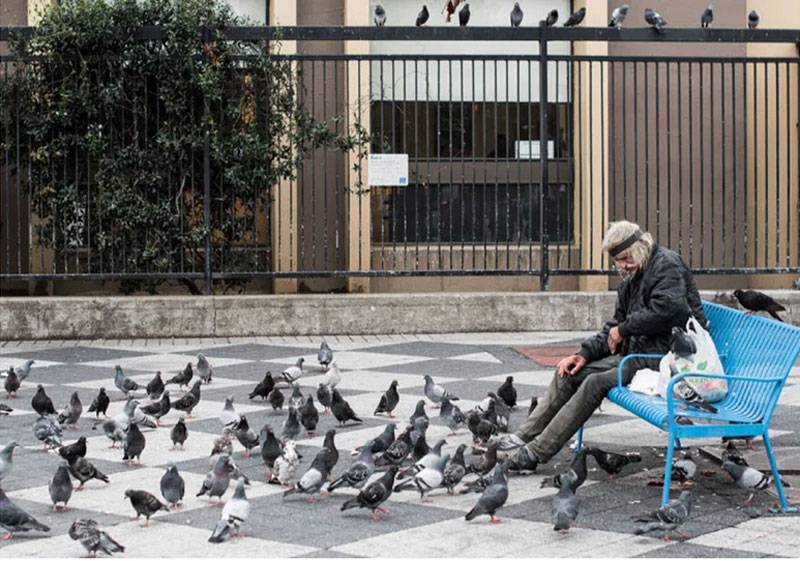Swan Song: Mission Bird Man Dies at 81
Historical Essay
by Annika Hom, February 2022, Originally posted in Missionlocal.org
John Ratliff, aka "Swan", with one of his best friends.
Photo: Julio Marcial
Lone Star Swan strode past Panchita’s, a baby pigeon huddled to his breast. He reached his destination, then lifted the bird to his face; its feathers were black, like the headband corralling Swan’s mop of white hair.
“These are advanced human beings,” Swan said of the hundreds of pigeons fidgeting around him. “These are ancient wizards that decide to reincarnate in something without hands, so man couldn’t put him to work.”
John Ratliff, also known as “Lone Star Swan,” “Swan,” “Saint Swan” and “The Birdman,” was an award-winning journalist and poet when, in 1972, he began experiencing psychotic episodes. Eventually schizophrenic and unhoused, he made the Mission’s 16th Street his home, and its pigeons his flock. On Monday, Feb. 7, he died at 3:15 p.m. from sepsis and aspiration pneumonia at Sutter Health Alta Bates Medical Center. He was 81.
For decades, he had been a neighborhood character, adored, ignored and watched over by a slew of locals, many connected with Adobe Books. Twice he was depicted in murals by Daniel Doherty, a Clarion Alley Mural Project artist. In one, he sits with seeds in outstretched hands, birds swirling around him; in the other, he’s stooped at Adobe Books, a vigilant pigeon flying over his head.
Swan mural by Daniel Doherty.
Photo: Carol M. Highsmith, 2012
Strangers and Mission locals helped him. Sometimes, Swan rebuffed attempts to get off the streets because he couldn’t live without the birds; he kept feeding them outside his window, pissing off neighbors and violating building rules, a 2019 Mission Local article recounted.
“I’m doing what I feel I must do,” Swan said in the 2002 documentary he starred in. “I guess I’m happy. I’m doing what I’m damn well gonna do.”
Early Life of John Ratliff
Swan was born in Poteet, Texas, on Aug. 31, 1940 to Rev. Henry Ratliff and Margaret Sale Ratliff. He was the eldest of seven children.
His father’s ministry led the family all over: Massachusetts, Tennessee, New Hampshire. “We were best buddies, but he was a teasing tyrant,” his sister Catherine said.
Swan was “very smart” and graduated in 1958, a year early, from Seymour High School in Wisconsin, where he already was a prolific poet. His sister said he had a strong-willed reputation, and learned to perfect an imitation of Elvis Presley to win over the girls.
He then went to Texas for a semester at Southern Methodist University, where he studied English. He served four years in the U.S. Navy and received an honorable discharge, and spent a year at the private Lutheran college Augustana University in Sioux Falls, South Dakota, where he met his future wife, Mary Overdahl. The two traveled to San Francisco and stayed for a year, partying among the hippies, Catherine said.
Swan returned to South Dakota to pursue journalism, and in 12 years he churned out more than 2,000 works and a dozen documentaries. He worked at the United Press International from 1965 to 1969, and simultaneously at the local Sioux Falls station KELO-TV from 1966 to 1969.
From 1969 to 1972, the job took him to news station WICS-TV in Springfield, Illinois, where Swan met a lifelong friend, Roger Wolfe. The pair often shot for each other on 16-millimeter film and grabbed lunch, when Swan would share his “unique perspective,” Wolfe recalled. Soon, Swan snagged a position as a filmmaking instructor at Sangamon State University, and worked on films or commercials that sometimes starred his children. He also completed educational freelance work for the State of Illinois; one 95-page script included scenes of monsters, knights and dancing.
Panelists noticed the quality. The San Francisco Film Festival, in 1974, awarded his documentary “SAM,” a 20-minute film that focused on an epileptic runner in the Special Olympics. He also won the United Press International Competition and an Associated Press Sweepstakes award in 1970.
John Ratliff in his documentary.
Swan married Overdahl in 1964 and they had four children, David, Charles, Krissa and Casey. His children remembered him as a remarkable father who instilled in them a love of writing, gave them coffee, and taught them gambling lessons. He and Overdahl wrote a lullaby that he sang nightly to the kids: “All the world spins around like an apple/on a tree that is painted blue/the sun, she’ll be back tomorrow/with a bright shining smile for you.”
By 1972 the schizophrenic episodes began, and violent tendencies followed. For a two-week period, Swan held the family hostage on a farm; the kids gnawed on corn, and Overdahl’s weight dropped to 85 pounds, she said in a two-part documentary “Schizophrenia.” In 1973, Overdahl took her children and separated from Swan. They officially divorced in 1977.
Each child would visit their father only a few more times in his life. “Us kids were very important to dad. It just broke his heart, when all the calamities came to a head,” said David, who is now a 57-year-old chess coach in Minnesota.
Months before Swan’s death, his children discovered his poem, “Snow,” which he dedicated to his “children in Minnesota.”
Becoming a Lone Star Swan rich in “rags”
In 1978, David kept a diary of the nine days he spent with his father in San Francisco. By then, his dad lived within walking-distance of Lombard Street with his girlfriend and her daughters. He took David on windy motorcycle rides, bought him fried ice cream and cheered him up with fatherly advice.
In 1981, David qualified for a chess U.S. Open tournament in San Francisco, and arrived with his nine-year-old brother, Casey, in tow. In that two-week period, Swan purchased a school bus and piled his family inside, including Casey, and moved to San Jose. Afterward, Casey hopped on a Greyhound back to the city, and returned home with his brother.
Catherine, Swan’s sister, who lives in Tennessee, saw him in the Mission again in 1986, after finding his writings pinned to a restaurant cork board. She said when she found him, he explained to her he had just finished talking to a gnat that told him the secrets of the universe.
Andrew McKinley, the owner of Adobe Books, remembered it was 1988 when Swan’s Volkswagen bus/home arrived back in the Mission. Back then, Adobe Books inhabited 16th Street, and Swan inhabited Adobe’s doorway and basement.
“He had this love of news; he had a love for animals and insects. But I guess he slowly devolved into a bird feeder,” McKinley previously told Mission Local. Around then, Swan began insisting that people call him Lone Star Swan.
Eventually, the bus was towed and Swan found himself on the streets. Still, he visited Adobe, which was the neighborhood’s living room then, according to John, a current Adobe staffer. Over the years John observed Swan, who smoked weed out front and sheltered in the store to write his one-sheet daily newsletter, dubbed Rags. Adobe possesses thousands of copies of the newsletter, and has considered assembling them into a book.
Sometimes, Swan’s daily newsletter declared political revolution or campaigns for president. One, advertising his presidential campaign, ran a giant photo of Swan’s self-declared “dreamy” younger self and read: “No Nukes. Pro-Grass & Women. No Parking Meters, Also, pro-Black.” He added: “RUN YOURSELF FOR PRESIDENT TODAY. PLASTER YOUR OWN PICTURE ALL OVER TOWN.”
Swan's newsletter
Frequently, Swan hung out on 16th Street. He sat at Picaro Cafe and the BART Plaza, tossing bird seed or rice to the pigeons. He fashioned splints for the injured ones, and recognized each, said John from Adobe. “He was a Mission character, like the Red Man,” he added. “He wanted everyone to like the underdog pigeons and the mice and roaches. He wanted them to be respected and things like that.”
To passersby, Swan was just another screaming, mentally-ill, unhoused resident trying to make it in San Francisco. He’d send his old friend and colleague Wolfe letters occasionally asking for money in exchange for a lengthy poem.
“He’d write a story and I’d think, I never would’ve thought of writing it like that,” Wolfe said. “It was always compelling.”
Eventually, Wolfe decided to film a documentary on schizophrenia and knew Swan should be his main character. Thanks to Google, in the early 2000s he traced Swan back to Adobe Books; McKinley answered and said, “Do you want to talk to him? He’s right here.” Swan agreed, and Wolfe arrived. He was shocked to see his old friend after all these years, plagued with paranoia and fixing up a sleeping bag on Adobe’s black-and-white tiled floor to sleep.
“I am schizophrenic. I am a thousand different characters. I have claimed to be God, Jesus, Buddha and Napoleon and backed it up and proved it,” Swan says in the documentary.
The voices in Swan’s head tortured him; Swan said the government tracked him, and he fretted because the voices plotted to kill his pigeons.
Swan with his pigeons at 16th Street BART plaza.
Photo: Julio Marcial
Over the years, Swan’s sister Catherine visited him multiple times and received his newsletter by fax. He’d show up randomly at her home in South Dakota at times, muttering that the CIA wanted to murder him, but would add that it was okay, because the local police department and half the FBI were on his side. That wouldn’t save his children, though, whom he feared that his enemies targeted to get to him.
And, at times, the schizophrenia rendered him confused about his children. When Casey visited in the early 2000s, he said, Swan demanded he show his identification; he denied his son’s hug, but relented to a handshake. Casey visited again in 2009, and stopped after that.
“We had some frank conversations that were hard to hear. I asked him if he loved us kids, and he said ‘no.’ I let go. Sometimes I think maybe I shouldn’t have,” Casey said. “I wonder if, in Heaven, he’s schizophrenic. It’d be cool if he wasn’t.”
It hurt Krissa, too. After the separation, she enjoyed a week with him in Chicago when she was 9. She met up with him again in San Francisco at 21, and had a good, lucid conversation, “and he’d flip a switch.” He said never to contact him again; “They” would try to get to him by coming for his daughter. She wouldn’t again until he got sick around 2018.
“As I was an adult, I started to understand that, in his own mind, he’s been protecting us his whole life by staying on the street and staying away from me,” said Krissa, who is now 53 and a doctor on a Native American reservation in Wisconsin.
The Swan Dive
In recent years, rumors circulated among concerned neighbors that Swan had died. He hadn’t, but he did end up in the hospital in around 2018 due to sepsis, an intense bodily response to an infection.
Catherine and his ex-wife alerted his daughter Krissa, who hadn’t seen him since she was 21. She spoke with him and said he sounded lucid. The father and daughter exchanged childhood stories, and then Swan became paranoid that the police were tracing the call.
Eventually he was discharged, and Krissa ensured her contact information was passed on to healthcare workers. She sent him sleeping bags and food through a sword-wielding Mission friend, Kenshin Shimayama. Swan’s legs were in poor shape, and he was again on the streets in 2019.
Later, Swan finally accepted a placement at a V.A. apartment in San Francisco. In October 2021, he fell and was found two days later by his social worker. Swan was transferred to the hospital, and Krissa and Charles flew out to see him. Charles joked that the San Francisco pigeons would hear about their arrival and swarm them, thinking Swan’s kids were “taking over the family business.”
They spent a few days with him, and Swan’s health improved. Each child fed and talked with their father, and showed him pictures of their children. Krissa planned a trip to visit in December, but omicron prevented it. They’d phone often, and he was the most lucid he’d been in 40 years, Krissa said.
His health took a turn for the worse at the end of January, 2022, and persisted. In February, Krissa Facetimed him in his new nursing home, telling him if he wanted to die and become a star, he could, and she’d see him in the sky. “Okay,” he replied peacefully. The doctor left them alone, and Krissa sang the lullaby he wrote for her and her siblings over and over until he fell asleep. He died two days later.
“I got my father back, even if it was for just a short time. He got himself back, and he was able to be sort of forgiven,” Krissa said. “I’d say, ‘I miss you, Dad. I love you.’ He’d say, ‘I miss you, Krissa. I love you.’”

